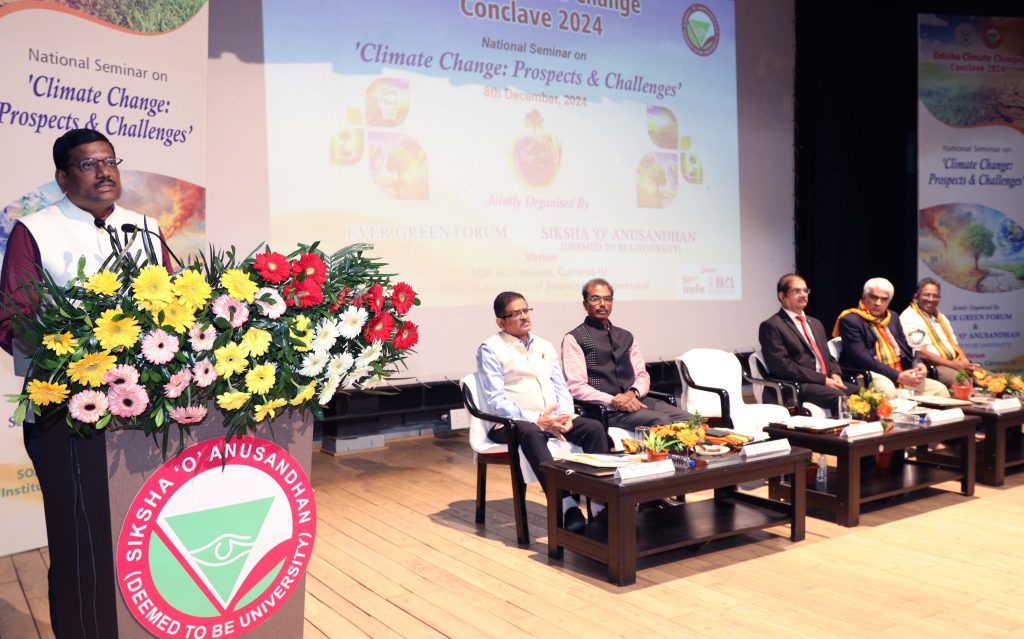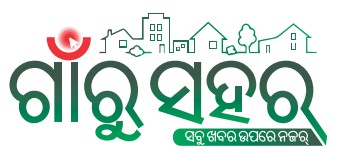Bhubaneswar, Dec. 9: With the world realizing that climate change was real and its impact being felt worldwide, experts on the subject have called for urgent steps to counter its effect on life and livelihood.
“Climate change is no longer a story or concept, it is a geographical phenomenon with local impact,” Prof. Pravat Kumar Roul, Vice-Chancellor of the Odisha University of Agriculture and Technology (OUAT), said while addressing the Odisha Climate Change Conclave organised at the Siksha ‘O’ Anusandhan Deemed to be University (SOA) here on Sunday.
The day-long conclave was jointly organised by SOA and Ever Green Forum, an organization working for environment and wildlife protection, to mark the World Climate Day.
Prof. Roul said the impact of climate change was being felt everywhere and a situation was emerging when only two seasons— dry and wet— would be experienced henceforth as climate change was leaving its footprint everywhere.
“Now cultivation of wheat in Odisha has become a thing of the past and growing mustard and potato will become difficult in the future,” he said adding methods have to be explored to mitigate the situation.
The inaugural session of the day-long conclave was also addressed by Dr. R. Krishnan, Director, Indian Institute of Tropical Meteorology, Pune, Mr. Ashok Kumar Biswal, Principal Chief Conservator of Forests, Mizoram and Prof. Santosh Kumar Rout, Dean of Institute of Agricultural Sciences, faculty of agricultural sciences of SOA, and Dr. Prakash Chandra Jena, President of Ever Green Forum.
Vice-Chancellor of SOA, Prof. Pradipta Kumar Nanda presided over the program.
Describing climate change as human-induced, Dr. Krishnan said climate change had warmed the atmosphere, ocean and land and was already affecting every region of the planet in multiple ways.
“The changes we are experiencing will increase with further warming,” he said while discussing the projected changes in water cycle and its implications.
Mr. Biswal, who described Mizoram as the cleanest state of the country, said the effect of climate change had serious implications in the absence of strong environment policies and promotion of unsustainable development and agricultural practices.
Mismanagement of water resources and failure to promote renewable energy were contributing to the impact of climate change, he said while arguing in favour of strong environment policies.
Pointing out that the society should not ignore indigenous knowledge, Mr. Biswal said the people had to stand together and face the challenges with wisdom.
“In 1958, when the Mizo hills were hit by a famine and food was scarce, the local people shared anything they had with one another for survival,” he said adding “in Mizo villages, if someone is building a house or road, dealing with a landslide or arranging a funeral, everyone come out to help voluntarily.”
The Mizo people rarely hire labour and care about each other’s well being setting an example which should be replicated elsewhere to face challenges like climate change, Mr. Biswal said.
Prof. Rout said climate change posed significant challenges to agriculture, particularly in vulnerable regions. Rising temperatures, erratic rainfall and frequent extreme weather events such as floods and cyclones disrupted the crop cycles, reduced yield and degraded soil health. “These changes also increase the prevalence of pests and diseases while exacerbating water scarcity further threatening agricultural productivity,” he said.
Prof. Nanda said though climate change was a global problem, it was thought of as a local issue. “While thinking of growth and development, we continuously neglected nature and it had boomeranged on us badly,” he said adding “we harmed nature in the pursuit of development.”
The different sessions of the conclave were addressed, among others, by Dr. Krishnan, Prof. Uma Charan Mohanty, Distinguished Professor, Centre for Climate Smart Agriculture (CCSA), SOA, Dr. Nabansu Chattopadhyay, President, International Society for Agricultural Meteorology, Dr. Manorma Mohanty, Director, Indian Meteorological Department, Bhubaneswar, Dr. Sarat Chandra Sahu, Director, Centre for Environment and Climate, SOA, Dr. Pramod Kumar Panda, Director, ICAR-Indian Institute of Water Management, Bhubaneswar, Dr. Rabindra Kumar Panda, Director, CCSA and Prof. Prasanta Kumar Patra, Dean, Sponsored Research and Industrial Consultancy, SOA.


